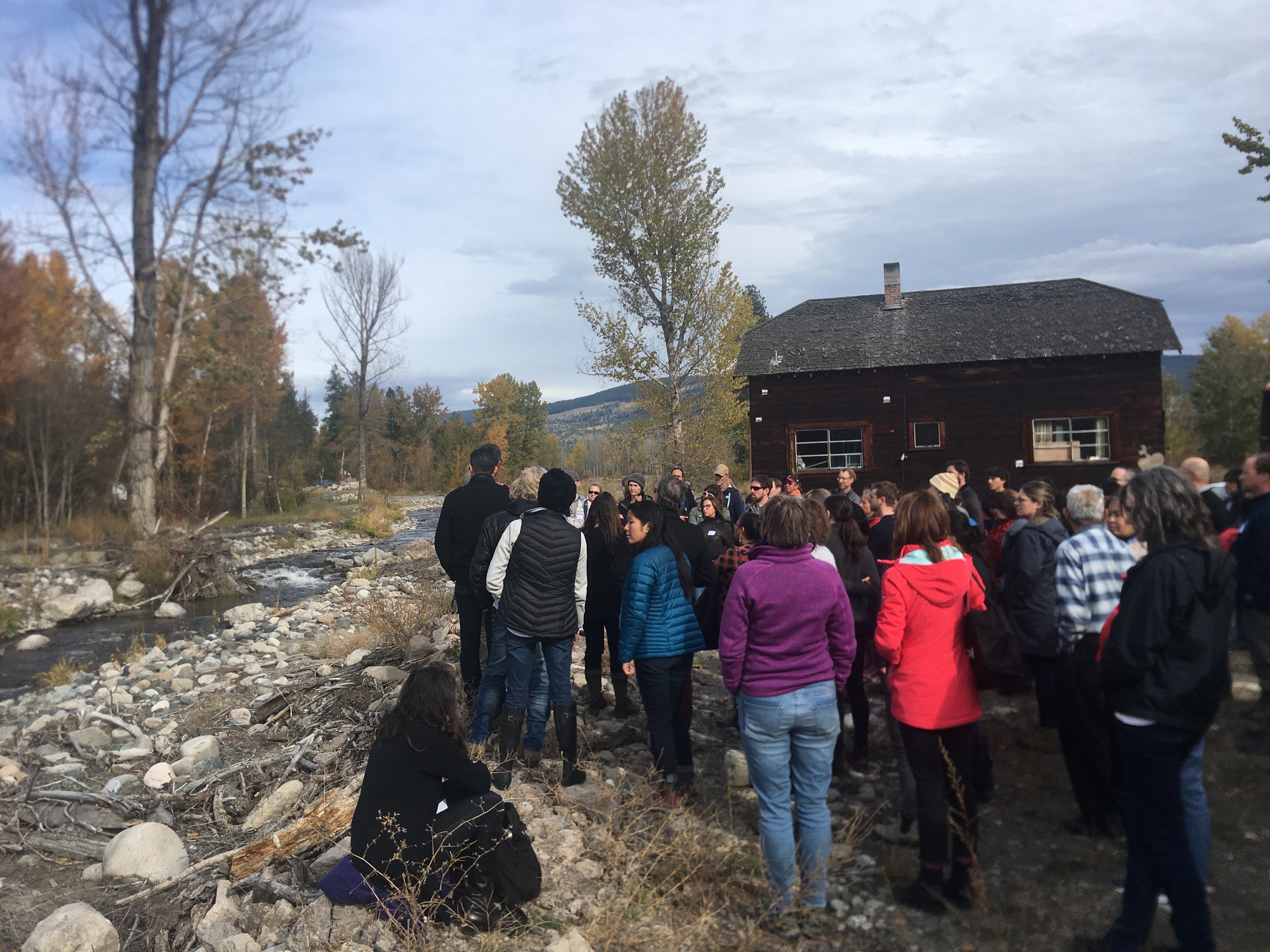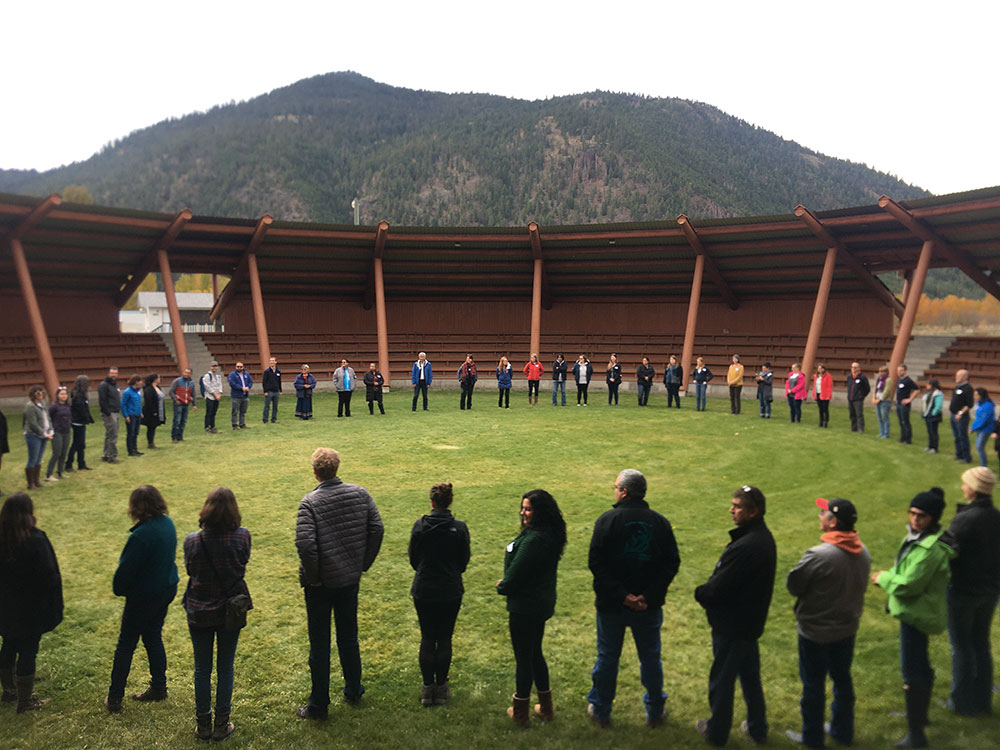If there’s one thing that nearly all First Nations in B.C. have in common, it’s salmon.
“Salmon are a foundation, a pillar, of First Nations culture in British Columbia,” says Hugh Braker, president of the First Nations Fisheries Council. “Virtually all First Nations, with the possible exception of the far northeast, rely on salmon. It plays an important part in their lives.”
In recent years, however, salmon populations have been declining precipitously.
Braker points to worsening climate change, overfishing and invasive species as a few of the threats to a sustainable and thriving population.
“Last year, we had a horrible heat wave that took almost 600 lives in British Columbia,” says Braker. “And we still don’t know what effect it might have had on the salmon in the lakes and rivers of the province. Sockeye salmon die if the river temperatures reach 73 F, and we know that some rivers did — and rivers like the Cowichan and Chemainus dried right up in places.”
There are 198 First Nations in B.C., each with its own traditional territory and needs. Prior to the FNFC, nations lacked a collective strategy for addressing their involvement in fisheries, and were often responding in isolation to government decisions that impacted their fishing or water rights. To provide a cohesive, singular voice for First Nations on fisheries issues, the First Nations Fisheries Council was created in 2006.
In addition to monitoring salmon populations, Braker explains, they look at issues like water quality and climate change, track industrial development that encroaches on waterways, and follow provincial and federal environmental rules.
These complex and wide-ranging issues are reviewed by the council, which has a regional model of appointed members from 14 geographic regions across the province, to ensure that the diversity of cultures and perspectives is represented.
“The FNFC is an incorporated society, so we don’t have Aboriginal rights,” explains Braker. “Our role is to advise First Nations, to do the work that they direct us to do, and to inform First Nations.” When the Fisheries Act was amended in 2019, Braker says, the FNFC made sure that First Nations were informed about the effects of the proposed changes.
“We facilitate discussion between the federal government, the provincial government, other organizations, and First Nations themselves,” he says.

One of the important initiatives of the FNFC is Water for Fish, which looks at threats to fresh water in B.C.— including pollution, industrialization or warming temperatures.
Water for Fish received the 2022 Fresh Water Land Award from the Real Estate Foundation of BC, for their work to align First Nations and organizations on freshwater policy and create equitable watershed co-governance models.
“We know that there are wide-ranging issues having an effect on the fresh water. Salmon return to their natal rivers to spawn, and they need clean water for that — and water that’s cool enough for them to traverse up the river,” said Braker, adding that trout, sturgeon and other species are also impacted by the quality of fresh water.
In response, the FNFC developed a research branch, led by project manager Susi Porter-Bopp, and formed what Braker calls a “water table,” which brings together appointed First Nations representatives and provincial government members. Together, they are considering how to balance the enormous pressures on water resources to balance the needs of businesses and industry, which require water to operate and sustain the B.C. economy, and First Nations communities, which require safe water to drink.
“That’s a very delicate bridge to walk over,” says Braker.
"In my view, they are one of the few organizations whose involvement is imperative in order to move the sustainable water-land use agenda forward, and get their mandate directly from member (not client) First Nation communities to engage in water issues,” said Deborah Curren, executive director of the Environmental Law Centre at the University of Victoria.
“The FNFC represents a collective of First Nations from across the province and are ideally placed to assist at all scales with reconciling Indigenous rights alongside moving towards sustainable water use.”
Since Braker joined the FNFC eight years ago, their work has only become more urgent as a result of worsening climate change. But he also points to dramatic changes in awareness. “I read yesterday that there’s a long wait for electric vehicles in B.C. If you had asked me 10 years ago about the demand for electric cars, I would have said that there is none at all,” says Braker. “I would say that all people in B.C. are more conscious about the need to help the environment.”
Braker, who is from the Tseshaht First Nation on Vancouver Island, points out that all of our consumption has an effect on the environment. “When I was a kid, my dad had two chicken coops,” Braker says. “He used to sell eggs to the local markets in Port Alberni. Today, all the eggs are trucked in. Why are we polluting the planet with gasoline and diesel fuel to bring fresh papaya and strawberries — which taste awful, by the way — all the way up from California and Mexico in the middle of winter? We have to think about these things.”
Braker is blunt when I ask if he’s optimistic about the direction things are heading. “No,” he says.
“There still has to be considerable movement by government, industry, First Nations people and the general public. The public in B.C. needs more information. They have to understand how dire the situation is, and industry and business have to make a commitment. They have to understand that they cannot destroy the environment just for the sake of a profit. Government has to understand that they bear a burden, and a responsibility to future generations of British Columbian people, people who aren’t even born yet. They owe them a responsibility to manage the resource in a way that they will be able to enjoy it, just like we do. And we haven't gotten to any of those points yet. Hopefully the water table's gonna help us do so.”
“A lot of people think that we're doing this just for First Nations, but we're not,” Braker adds.
“I think it would be good for us if one of the pillars of our cultures was reinvigorated, but it's not just for us. I think it would benefit all British Columbians if there was a really healthy return of salmon happening each year, and also herring, and the other species of seafood too. This province won't be hurt, it'll benefit. We’ll all benefit from it.” ![]()
Read more: Indigenous, Food, Environment
This article is part of a Tyee Presents initiative. Tyee Presents is the special sponsored content section within The Tyee where we highlight contests, events and other initiatives that are either put on by us or by our select partners. The Tyee does not and cannot vouch for or endorse products advertised on The Tyee. We choose our partners carefully and consciously, to fit with The Tyee’s reputation as B.C.’s Home for News, Culture and Solutions. Learn more about Tyee Presents here.


















Tyee Commenting Guidelines
Comments that violate guidelines risk being deleted, and violations may result in a temporary or permanent user ban. Maintain the spirit of good conversation to stay in the discussion.
*Please note The Tyee is not a forum for spreading misinformation about COVID-19, denying its existence or minimizing its risk to public health.
Do:
Do not: